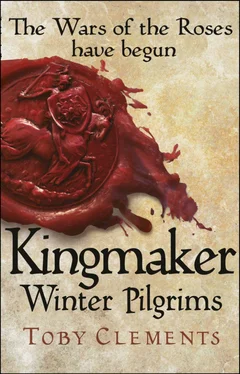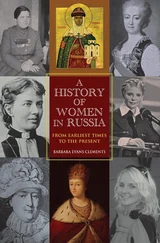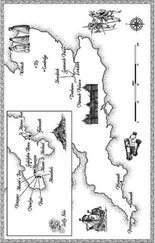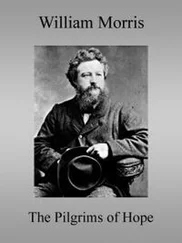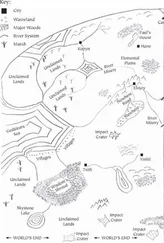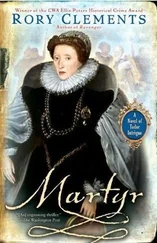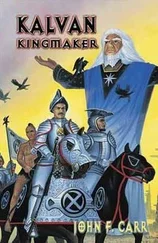Toby Clements - Kingmaker - Winter Pilgrims
Здесь есть возможность читать онлайн «Toby Clements - Kingmaker - Winter Pilgrims» весь текст электронной книги совершенно бесплатно (целиком полную версию без сокращений). В некоторых случаях можно слушать аудио, скачать через торрент в формате fb2 и присутствует краткое содержание. Год выпуска: 2014, Издательство: Random House, Жанр: Исторические приключения, на английском языке. Описание произведения, (предисловие) а так же отзывы посетителей доступны на портале библиотеки ЛибКат.
- Название:Kingmaker: Winter Pilgrims
- Автор:
- Издательство:Random House
- Жанр:
- Год:2014
- ISBN:нет данных
- Рейтинг книги:5 / 5. Голосов: 1
-
Избранное:Добавить в избранное
- Отзывы:
-
Ваша оценка:
- 100
- 1
- 2
- 3
- 4
- 5
Kingmaker: Winter Pilgrims: краткое содержание, описание и аннотация
Предлагаем к чтению аннотацию, описание, краткое содержание или предисловие (зависит от того, что написал сам автор книги «Kingmaker: Winter Pilgrims»). Если вы не нашли необходимую информацию о книге — напишите в комментариях, мы постараемся отыскать её.
Kingmaker: Winter Pilgrims — читать онлайн бесплатно полную книгу (весь текст) целиком
Ниже представлен текст книги, разбитый по страницам. Система сохранения места последней прочитанной страницы, позволяет с удобством читать онлайн бесплатно книгу «Kingmaker: Winter Pilgrims», без необходимости каждый раз заново искать на чём Вы остановились. Поставьте закладку, и сможете в любой момент перейти на страницу, на которой закончили чтение.
Интервал:
Закладка:
Riven is unmistakable now. In fine plate, he is fighting with a long-handled hammer. He turns to trap a bill under his arm and slash its poorly protected owner across the face. Then he spins to take a blow on the languet of his hammer and he switches hands and drives the helve into a man’s face. In the single moment, he has killed two men. It has cost him almost no effort, no thought, and he is preparing to do it again. But now Thomas is before him and for a brief moment Thomas imagines Riven recognises him and hesitates.
But if he does, he does not hesitate for long.
He launches himself at Thomas and Thomas moves to parry the blow, but of course it is a feint, and Riven is on him from below. Thomas throws himself inside the blow, flinching as the hammer fluke slides across his chest, and he crashes his bill into Riven’s steel elbow.
Riven is beaten back but comes again. He goes high but hits low, catching Thomas on the knee, sending a barely manageable jolt of pain up his spine. He cracks a short-armed blow in Thomas’s face, but Thomas ducks, and then the hammer glances off his helmet. It rattles his teeth and he tastes blood but he is not dead. Riven seems surprised. Thomas goes at him. He feints, lunges, draws him left then right, and thrusts for his armpit. But he trips. Staggers. Is down. The bill is gone. Riven rears over him, raises his hammer in both hands. Thomas is down among the dead, nearly one of them. He rolls. The bodies around him trap him, hold him fast, but before Riven can bring down the hammer one of Fauconberg’s men intervenes with a jab. He catches Riven and turns him, distracting him long enough for Thomas to hurl himself forward with the rondel dagger in his fist. He can drive it up under Riven’s steel skirt. But Riven grips him and hauls him upright. They are face to face. Thomas presses his cheek to Riven’s visor to stop him butting him. He forces his right arm free and slides the dagger up his ribs. He will stab him in the armpit.
Then the giant arrives.
He has the pollaxe. The pollaxe he reclaimed from Walter. He swings it at Thomas’s spine and connects with a force that rips Thomas from Riven’s embrace and casts him across the heaving layer of steel-clad bodies that cover the ground. He twists with the pain and falls on his back. He lies there, unable to move for the agony. He stares up at the crisscross of weapons above him, watching the giant batter away at two of Fauconberg’s men, watching Riven kill the billman who’d earlier saved his life. He feels the man sprawl across his legs and then he feels nothing. It is as if he is floating in warm water, his head swaddled, his hearing muffled.
He wonders again if he is dying.
He thinks of Katherine. He wants thoughts of her to be his last. He wants to tell her that he is sorry. Sorry for dying here, sorry for leaving her.
Above him the fight continues. Men fall by his side. There is blood in the air, scraps of metal and shards of splintered wood, a tooth, something gory.
Thomas watches the swings and blows, back and forth. He watches the snowflakes fall, and he wonders if this is what death is. No triumphant entry through heaven’s gate, or agonised descent into hell, only this: detachment, an eternity spent on the field where you died, an eternity spent ruing all your sins of commission, and all your sins of omission.
But now he finds he can move. His fingers are coming to life.
Can it be that he is not dead?
He moves his head.
He lurches, rolls over. There is a brief lull in the fight. Men are pulling back, taking stock. Exhausted men are retiring. New men are coming up.
Thomas is on his hands and knees; he has only one thought in his mind: to get away. He begins crawling, one hand after the other, slithering through the blood, back across the armoured corpses that are covered in gore and shit. Dead men stare up at him with noses smashed and mouths and chins slashed open. Some are still alive, spitting blood, bleeding through their ears. He gasps for breath and the pain is a burning band around his chest.
He can hear himself moaning like a beast in agony as he crawls through the line of Fauconberg’s men and slumps against a corpse. He rests his cheek against the dead man’s breastplate and closes his eyes.
He saw the giant. He knows that pollaxe. He should have a broken spine. He should have a fluke buried a handspan in his back. And yet. Here he is. Alive.
He raises himself and crawls on. The blood is pooled between the bodies, deep enough to drown a man. Everything is sodden with it. Everything is red. He finds a bill in the crook of a dead man’s elbow and hauls it out. He stabs it in the bloody slush and levers himself up on to one knee.
The pain is terrible, yet not as bad as it should be. He inches his arm around behind his back to press against the wound. Then he wheezes a laugh. So that is it. The ledger. The giant hit the ledger. Thomas swings the bag around to see where the fluke has punched a hole through the leather, and he puts his finger in the wound up to his bloody knuckle.
It is the pardoner’s final lifesaving gift.
And now sound returns and Thomas can hear the crash of steel and the shouting of men as the fighting continues. Fauconberg’s line is giving once more, bowing towards him. Riven and his men are forcing their way through and if Fauconberg’s line is thinned any further, then the northerners will break it. They will have won and the battle will be over. Once this flank is turned, then the whole army will be wrapped up, pushed down the hill and murdered at will. Some of them may try to run, he supposes, but then he remembers the bridge. That is as far anyone’ll get. That’s where the remainder will die. Perhaps that is why the northerners broke the bridge in the first place: not to stop them coming, but to stop them leaving.
There are no trumpets calling for men to bolster the line, for the trumpeters have fled, or they’ve been forced to throw down their instruments and join the line, and anyway even if they were there to blow the signal, there are no men to obey it. There is no reserve left.
This is it.
He whom they call Edward Plantagenet, formerly the Earl of March, then the Duke of York, had wanted God’s judgement on his right to be king, and God has delivered it: he has no right, and so now all his men must pay the price of that gamble.
Riven’s flag is carried high as he comes between the ranks: Thomas can see him, hacking through; and there is the giant, just behind him, crashing men aside with that pollaxe. Thomas wonders whether his one-eyed son is there too, his wound hidden under his visor.
He thinks back to the moment he first saw Riven, when he first saw Katherine. He thinks of their time in Calais, and then the summer at Marton Hall. He thinks of the hills in Wales, and that week in the inn in Brecon. He thinks of Walter, and of Dafydd and Geoffrey, and all the Johns. He thinks of the Dean. Of Margaret. And now it is over. He will never avenge any of them now.
He swings the ledger back over his shoulder and unplugs the bill from the sloppy earth.
He stands.
He will at least die on his feet.
And then from behind him comes the sound of trumpets, faint, distant, thin. He turns. Along the road is a mass of men coming through the snow, grey and indistinguishable at this distance. There is a lull, infinitesimal, a let-up in the constant clash of steel as men turn to face the new arrivals.
‘It’s the White Lion!’ a man shouts. ‘It’s the Duke of bloody Norfolk! Blessed be God!’
It is the men that boy had been waiting for, his father among them. There is a surging cheer along the ranks of King Edward’s men as the news spreads, and Fauconberg’s men are heartened and they rejoin the line with renewed vigour. Men in blue and white run past him, hurrying to wade back into the fight, hurrying to hold the line.
Читать дальшеИнтервал:
Закладка:
Похожие книги на «Kingmaker: Winter Pilgrims»
Представляем Вашему вниманию похожие книги на «Kingmaker: Winter Pilgrims» списком для выбора. Мы отобрали схожую по названию и смыслу литературу в надежде предоставить читателям больше вариантов отыскать новые, интересные, ещё непрочитанные произведения.
Обсуждение, отзывы о книге «Kingmaker: Winter Pilgrims» и просто собственные мнения читателей. Оставьте ваши комментарии, напишите, что Вы думаете о произведении, его смысле или главных героях. Укажите что конкретно понравилось, а что нет, и почему Вы так считаете.
